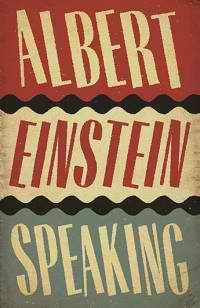Albert Einstein Speaking by R.J. Gadney
 Friday, October 19, 2018 at 8:10AM
Friday, October 19, 2018 at 8:10AM 
Published by Canongate Books on June 12, 2018
Albert Einstein Speaking begins with a wrong number dialed by 17-year-old Mimi Beaufort in Princeton, who finds herself speaking to the most famous scientist in the world on his 75th birthday. Einstein likes her voice and tells her to call back. Then he begins dictating correspondence and random thoughts to his secretary, reflecting on war, the horrible treatment of Jews in Germany, the horrible treatment of blacks in America, and his own inadequacies as a parent and husband.
A story that begins as fiction and quickly transitions to a fictional autobiography soon becomes a biography. It briefly recounts Einstein’s life from childhood (his mother thought he was a strange boy who would amount to nothing), with little touches that foreshadow the man he would become (including his awe and fear of the mysterious forces that prevented him from tricking his compass to point in a direction other than north, his first inkling that “there’s something behind things, something deeply hidden”). Later he confronts antisemitism at a Catholic school. It’s no wonder he preferred the glory of his own mind to an educational system that was nothing but a distraction from intellect.
We follow Einstein through his career (first in the patent office and later in various academic positions), his relationships, his battles with anti-Semites in the European scientific establishment, and his remarkable ability to make deductions about how the world works. We learn that he is a terrible husband and not much of a father but hey, he’s Einstein, he doesn’t have time for conventional ways of living.
The story emphasizes how Einstein was belittled, and his theory of relativity mocked, because he was Jewish. Later in life we get a glimpse of his regret for suggesting to Roosevelt that he pursue an atomic bomb, and learn that Einstein was not immune to the FBI’s misguided pursuit of communists during the age of McCarthyism.
Most of the story consists of one abbreviated event following another. In fact, Albert Einstein Speaking often reads like an abbreviated biography that lists facts while minimizing context or analysis. Pages and pages go by without a hint that the book is a work of fiction, so resolutely does it recount Einstein’s travels, lectures, letters, meetings, and decisions. That doesn’t mean the book lacks interest, but it isn’t what a reader expects from a novel. Only when the story returns to Mimi does the book really come alive.
Albert Einstein Speaking reminds us that closed minds will happily reject the rigors of scientific inquiry when inquiry leads to results that get in the way of politics or prejudices (not that a reminder is needed, given the prevalence of global warming deniers). An openness to inquiry and free thought is an openness to people, and hence a rejection of racism, of religious prejudice, and of all notions of national superiority or exceptionalism. Humility and compassion on a global scale were Einstein’s great virtues, apart from his intellect. The virtue of Albert Einstein Speaking is its reminder that true genius lies in learning how to live harmlessly, in harmony with nature and with all the people who are not us.
RECOMMENDED
Reader Comments